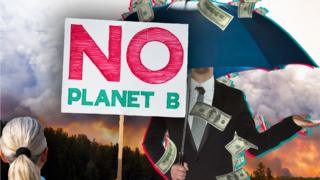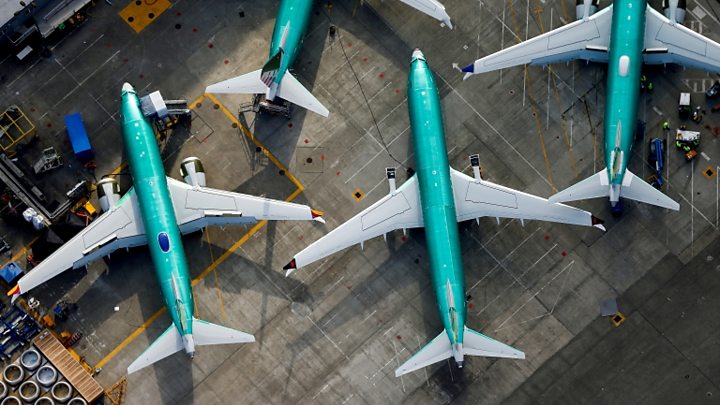 Image copyright Getty Images
Image copyright Getty Images Ten billion dollars – or £7.7bn – sounds like a serious amount of money.
It’s how much the world’s richest man Jeff Bezos has said he’ll spend to fight climate change.
But what do you even spend $10bn on? And is it anywhere near enough?
According to Professor Elizabeth Robinson from the University of Reading, some of the solutions are known about but “are still not happening”.
Cleaner energy
Elizabeth, an expert in environmental economics, suggests the money could be spent on persuading governments to stop funding fossil fuels – which produce carbon dioxide and warm the planet.
“We need to start investing in clean energy instead like renewable. If we do that, we’re a lot of the way there.”
The UK government announced a deal last year with the wind industry to ensure 30% of electricity comes from offshore wind by 2030.
Seamus Garvey, an energy storage expert at the University of Nottingham, agrees that renewable energy is key.
He says the technology is available but it needs to be “made cheaper” for people to use. “It’s about flexibility in electricity.”
Seamus suggests the need to mix wind and solar energy so it works all year long.
“Wind is very seasonal and blows strongly in the winter – as Storm Dennis has shown us. Solar is also seasonal and the sun shines mostly in the summer. So we need to balance it out.”
‘Invest in transport’
There’s lots of talk around the impact of cars and planes on the environment, so Elizabeth suggests money needs to be spent upgrading transport systems.
“We need to start investing in affordable low-cost public transport so people choose to move out of their cars and into trains.”
She adds that subsidising long-distance public transport to make it “affordable and reliable” means people may “choose to not fly”.
“We need alternatives – people living in mainland Europe can often take the train to wherever they want to go.”

Media playback is unsupported on your device
Some people choose to do something called carbon offsetting – paying extra to contribute to environmental projects that reduce the amount of CO2 in the atmosphere.
Seamus calls this “a good thing in principle, but not enough in practice”.
“If we were to do proper carbon offsetting, we would be paying a lot of money.”
Elizabeth says that while she doesn’t “begrudge anyone getting on a flight for a holiday or see family”, the only way to really make a difference is “to fly less”.
‘Protect our forests’
Targeting key areas that are good for the environment can help too, Elizabeth says.
“To protect our forests we need to do things like rewilding and planting trees where it makes sense to plant trees.”
And, she believes, agriculture needs to be developed too because it “contributes a large proportion” of emissions globally.
“We have to eat – but we need to find ways to do agriculture and forestry better.”
According to Elizabeth, there are “technological solutions” for growing crops which can make removing carbon dioxide from the atmosphere “more efficient”.
But is $10bn enough?
Jeff Bezos is the boss of Amazon – one of the world’s biggest companies – and in 2018 its corporate carbon footprint was 44.4 million metric tons.
“Which is a lot, like a small country,” says Seamus.
“Jeff Bezos can’t solve climate problems with $10bn on its own. It could be significant, but it’s not enough to even transition the energy in the UK.”
Seamus says the money “could kickstart” other companies which are able to help – after the Amazon founder said he would finance work by scientists, activists and other groups.
Elizabeth says big companies like Amazon have a “moral obligation” to tackle climate change.
“They’re making huge profits. So it wouldn’t really be that hard.”
In a statement to Radio 1 Newsbeat, Amazon said that it was their “vision to make all Amazon shipments net zero carbon, with 50% of all shipments net zero by 2030.
“Amazon’s sustainability team is using a science-based approach to develop data and strategies to ensure a rigorous approach to our sustainability work.
“We have launched several major and impactful programmes and are working hard to integrate this approach fully across Amazon.”
Looking worldwide
Lower income countries which aren’t as developed usually have higher levels of fossil fuels.
Elizabeth says money should be used to help those countries develop and move away from damaging fuels.
“That’s where some of that $10bn could have a real impact. Those countries are under pressure to reduce poverty and grow economically, and they’re using dirty energy to do that. So finding a way to develop without using those would be helpful.”
And is it just about the money?
“It’s about having a commitment as well,” says Elizabeth.
Follow Newsbeat on Instagram, Facebook, Twitter and YouTube.
Listen to Newsbeat live at 12:45 and 17:45 weekdays – or listen back here.
Click Here to Visit Orignal Source of Article https://www.bbc.co.uk/news/newsbeat-51544501

